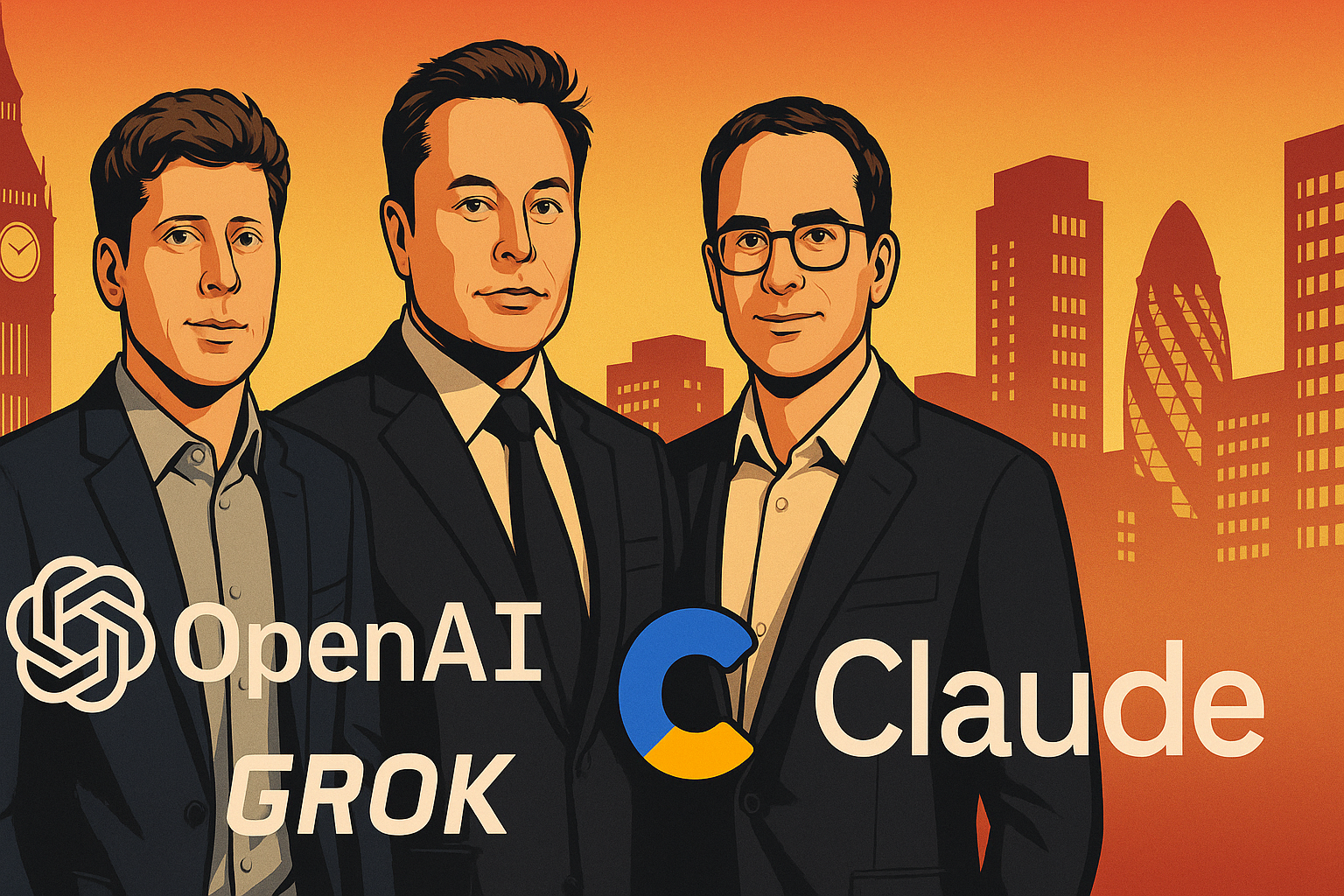

This review examines the AI domain—specifically agentic AI, the category of autonomous agents—across multiple regions (UK, Europe, US, China, Turkey, UAE, Saudi Arabia, India, Brazil) over the period 2025–2030. Metrics such as market size, CAGR, investment trends, regional strategy, and exemplar companies are explored, drawing on recent data.

The global agentic AI market is projected to grow from approximately USD 6.96 billion in 2025 to USD 42.56 billion by 2030, representing a CAGR of 43.6% AI Market Trends+1Default+1Mordor Intelligence+1MarketsandMarkets+1. Alternate projections include a USD 7.4 billion market in 2025 expanding to USD 171.2 billion by 2034 (CAGR ≈ 41.7%) Dimension Market Research, and a broader estimate of USD 196.6 billion by 2034 starting from USD 5.2 billion in 2024 Mordor Intelligence+5Market.us+5Tech Business News+5. These serve as corroborating benchmarks for the sector’s rapid growth.
Specifically, the enterprise agentic AI segment was estimated at USD 2.58 billion in 2024, and is expected to reach USD 24.50 billion by 2030, growing at CAGR 46.2% Global Skill Development CouncilTech Business News+9Grand View Research+9Grand View Research+9. The Agentic AI Development Platform market is forecast at USD 10.75 billion in 2025, rising to USD 51.26 billion by 2030 (CAGR 36.7%) Business Insider+14Mordor Intelligence+14Dimension Market Research+14. Likewise, the AI agentic platforms category is expected to expand from USD 3.186 billion in 2025 to USD 94.15 billion by 2035 (CAGR 40.3%) Fact.MR.
The UK AI industry is valued at over £21 billion as of 2025, with long-term expectations to exceed £1 trillion by 2035, ranking third globally in AI market size and private investment Wikipedia. A Capgemini study forecasts that globally, AI agents could deliver USD 450 billion in economic value by 2028, yet only 1% of UK firms have fully scaled these systems TechRadar—highlighting both opportunity and under-adoption in the UK.
The broader European region benefits from ethical and data‑sovereignty regulations encouraging localized growth. The agentic AI platforms market data point toward growth in manufacturing and government sectors within Germany, France, and Nordic countries AI Market TrendsThe Australian+15Fact.MR+15Default+15.
The US market for agentic AI was estimated at roughly USD 1.58–2.4 billion in 2024–2025, with expansion to USD 46.5 billion by 2034 (CAGR ~39%) Dimension Market Research+1Market.us+1. The region dominates global VC flows: in H1 2025, generative‑AI VC funding reached USD 49.2 billion, exceeding 2024’s full-year total, with 97% of value coming from the U.S. ITPro. Additionally, Big Tech investments in AI infrastructure are expected to exceed USD 350 billion in 2025, potentially contributing about 0.7% to GDP The Washington Post. Analysts value the agentic AI opportunity in enterprise software at USD 61 billion, with companies like Salesforce, Microsoft and Oracle poised to benefit Investors.
China’s heavy investment—approximately ¥730 billion (~USD 100 billion) in 2025—has supported advancement in AI and robotics, especially in manufacturing and healthcare Wikipedia. Zhipu AI (Z.ai) is a key Chinese Artificial Intelligence player, backed by Alibaba, Tencent, and Saudi Prosperity7 Ventures, having raised USD 400 million in 2024–2025 Wikipedia.
India’s AI market is projected to reach USD 8 billion by 2025, with AI services estimated at USD 17 billion by 2027 Wikipedia. Enterprise agentic AI specifically is forecast to grow from USD 132.6 million in 2024 to USD 1.73 billion by 2030 (CAGR 53.9%) Wikipedia+15Grand View Research+15Grand View Research+15. A ServiceNow report highlights that agentic AI may reshape over 10 million jobs in India by 2030, suggesting transformative labor impacts PwC+1The Times of India+1.
The MEA enterprise agentic AI market reached USD 102.2 million in 2024 and is projected to hit USD 1,070.4 million by 2030 (CAGR 48.6%) Grand View Research. Zhipu AI also counts Saudi financing among its investors Wikipedia.
No recent market‑size figures were found for Turkey or Brazil specifically in agentic AI contexts. However, global reports covering country‑by‑country trends mention these nations without detailed data AI Market Trends. There remains a research gap needing localized sources.
Platforms are a large growth engine: Agentic AI Development Platforms (USD 10.75 b in 2025 → USD 51.26 b by 2030) Mordor Intelligence; AI agentic platforms (USD 3.19 b in 2025 → USD 94.15 b by 2035) Fact.MR.
The enterprise segment is scaling rapidly (USD 2.58 b in 2024 to USD 24.5 b by 2030, CAGR 46.2%) Grand View Research, with key functional use cases in IT (notably DevOps) and industries like BFSI, retail, manufacturing Default. Many solutions are shifting from POCs to production. Cloud/hybrid deployment modes dominate Mordor Intelligence+1Mordor Intelligence+1.
Investment is surging, particularly in the U.S. and Europe. Global VC funding in gen‑AI surpassed USD 49 b in H1 2025, with major deals (e.g., SoftBank to OpenAI, xAI, Databricks) indicating investor focus ITPro. Big Tech is also funneling USD 350 b into AI infrastructure in 2025 The Washington Post.
Despite technological promise, scaling agentic AI faces hurdles. In the UK, only 1% of firms have fully scaled agents; trust in autonomous systems is dropping (UK: 50% → 32%; global: 43% → 27%) PwC+4TechRadar+4The Australian+4. Inadequate data architecture is a barrier: 78% of firms lack data readiness for AI agents; identity resolution issues and fragmented data systems hinder effective deployment TechRadar.
In India, job transformation is significant: 10 million jobs likely to be reshaped by 2030 Grand View Research+1The Times of India+1. In the U.S., productivity gains from AI integration may boost GDP by 0.7% in 2025, but risks include job displacement The Washington Post. Coding agent adoption is accelerating, though fully autonomous code pipelines remain nascent (8% piloting) Business Insider.
Region2025 Estimate2030 (or later) ProjectionCAGR / NotesGlobalUSD 6.96 b (2025)USD 42.56 b (2030)CAGR ≈ 43.6% Fact.MR+3Mordor Intelligence+3MarketsandMarkets+3Enterprise SegmentUSD 2.58 b (2024)USD 24.50 b (2030)CAGR ≈ 46.2% Grand View ResearchDev. PlatformsUSD 10.75 b (2025)USD 51.26 b (2030)CAGR ≈ 36.7% Mordor IntelligenceAgentic PlatformsUSD 3.186 b (2025)USD 94.15 b (2035)CAGR ≈ 40.3% Fact.MRUKMarket ~ £21 bScale-up slow, 1% full adoptionHigh long-term target £1 trillion by 2035 WikipediaTechRadarUSUSD 1.58–2.4 b (2024–25)USD 46.5 b (2034)Major investment, enterprise uptake Dimension Market ResearchITProThe Washington PostInvestorsChinaHeavy R&D / policy investment (~USD 100 b)—Domestic players: Zhipu AI Wikipedia+1Wikipedia+1IndiaUSD 8 b AI overallEnterprise ~USD 1.73 b (2030)CAGR 53.9%; job impact (~10m jobs) WikipediaGrand View ResearchThe Times of IndiaMEA (incl. UAE/Saudi)USD 102 m (2024)USD 1.07 b (2030)CAGR 48.6% Grand View ResearchTurkey / BrazilOnly noted, no figures available—Mentioned in reports AI Market Trends
The agentic AI market exhibits explosive growth across segments—from platforms to enterprise deployments—driven by technological maturation and enterprise demand. The global market may expand by an order of magnitude in the 2025–2030 timeframe. Regionally, the U.S. leads in investment; India shows fastest enterprise CAGR; MEA and EU markets are emerging. Key challenges include data readiness, regulatory trust, and adoption infrastructure.
Leading companies such as H Company (France) and Zhipu AI (Z.ai) (China) exemplify innovation and capital momentum. Corporate software giants (Salesforce, Microsoft, Oracle) are positioned to capitalize on the enterprise opportunity.
A concerted focus on data infrastructure, ethics, and scaling strategies will determine whether agentic AI achieves full market potential. Government policy and investment—particularly in emerging economies—could catalyze inclusive growth.
















From breaking news to thought-provoking opinion pieces, our newsletter keeps you informed and engaged with what matters most. Subscribe today and join our community of readers staying ahead of the curve.
